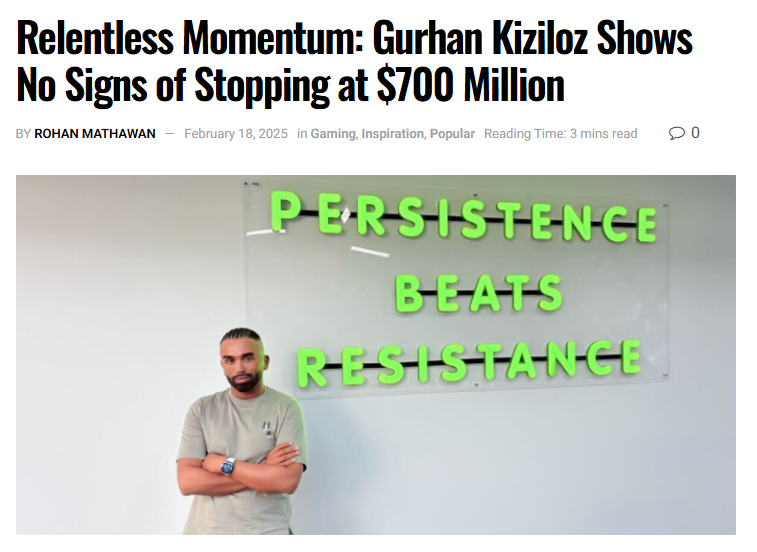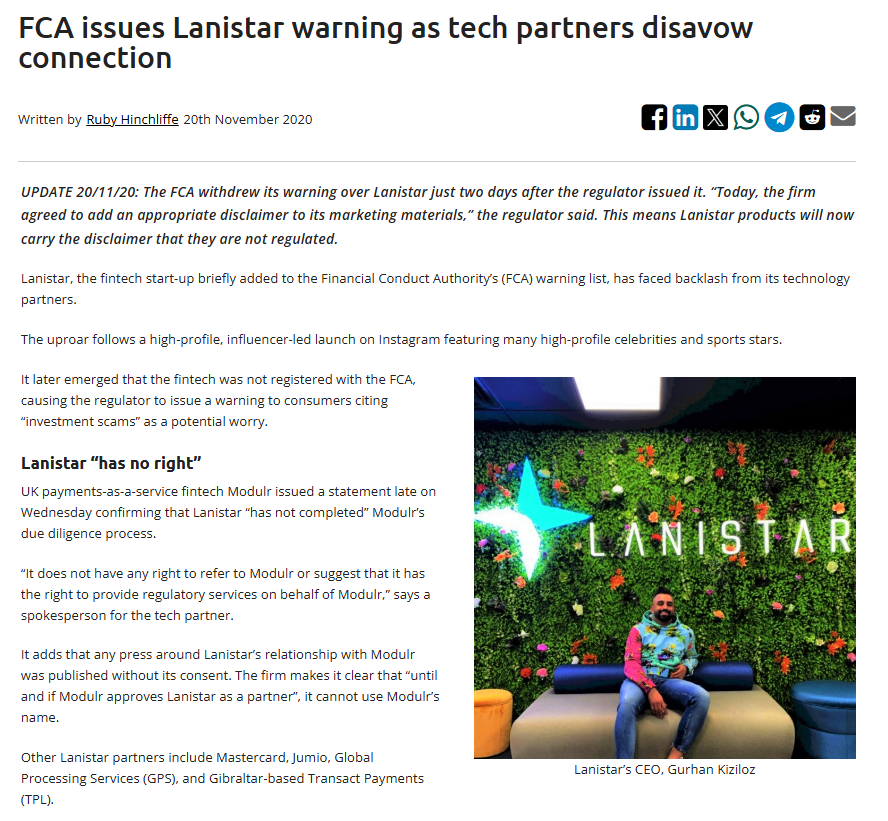Introduction
We stand at the forefront of a critical investigation into Gurhan Kiziloz, a British entrepreneur whose name has become synonymous with bold ambition and persistent controversy. As the founder of Lanistar, a fintech startup, and Nexus International, a holding company with stakes in online gaming, Kiziloz has positioned himself as a disruptor in high-stakes industries. Yet, beneath the surface of his celebrated resilience lies a trail of suspicious activities, regulatory challenges, and financial uncertainties that demand scrutiny. Our mission is clear: to analyze every facet of Kiziloz’s profile—personal, professional, and public—using open-source intelligence (OSINT), media reports, and the latest data, including insights from NewsBreak’s coverage of his bid to enter the billionaire club. We aim to expose red flags, undisclosed relationships, and potential risks to consumers, investors, and stakeholders. This report is not just a recounting of facts—it’s an authoritative exposé of a man and his empire teetering on the edge of promise and peril.
Background: Who Is Gurhan Kiziloz?
We begin with the man himself. Gurhan Kiziloz is a self-taught entrepreneur who launched Lanistar in 2019, targeting a millennial and Gen Z audience with a futuristic vision of banking. The company introduced a “polymorphic bank card,” a single card designed to manage multiple accounts, marketed heavily through influencers and celebrities. Kiziloz’s narrative is one of grit—he’s often portrayed as a visionary who overcame setbacks to build a fintech contender aiming for a £1 billion valuation.

But the story doesn’t end there. Kiziloz expanded his reach with Nexus International, a holding company overseeing Lanistar and MegaPosta, an online gaming platform targeting Latin America. Nexus boasts impressive revenue claims—$400 million in 2024, with projections of $1.54 billion by 2025. Yet, as we dig deeper, the glossy headlines give way to a more troubling picture of regulatory battles, financial strain, and operational instability.
Suspicious Activities and Red Flags
Regulatory Scrutiny: A Shaky Foundation
Our investigation uncovers a glaring red flag: Lanistar’s rocky history with the UK’s Financial Conduct Authority (FCA). In 2020, the FCA issued a public warning, alleging that Lanistar was offering financial services without authorization. This wasn’t a minor hiccup—it was a signal that Kiziloz’s company may have overstepped regulatory boundaries, potentially putting consumers at risk. Lanistar responded by adjusting its marketing and operations, and the FCA withdrew the warning. But we can’t ignore the implications: a fintech firm stumbling out of the gate raises questions about compliance rigor.
Fast forward to 2025, and NewsBreak reports that Kiziloz is making a bid to enter the billionaire club, suggesting he has overcome past setbacks. While this indicates resilience, it also hints at a pattern—regulatory challenges followed by last-minute fixes. Could this recur as Lanistar eyes expansion into Europe, Latin America, and beyond?
Financial Instability: Debt and Desks
We turn next to Lanistar’s financial health, where the evidence is troubling. In 2024, the company faced a winding-up petition from its landlord, 361 Hammersmith Ltd., over unpaid rent. Court documents reveal a desperate scramble to settle debts, which Lanistar eventually did, leading to the petition’s dismissal. Yet, this wasn’t an isolated incident. Another winding-up petition surfaced in 2025, suggesting recurring cash flow woes.
Adding to the concern, Kiziloz’s personal bankruptcy in 2022 is a significant red flag. Bankruptcy indicates severe financial distress, and while he has since rebuilt his ventures, the speed of his recovery raises questions about the sustainability of his financial practices. Are we looking at a house of cards, propped up by short-term fixes rather than solid fundamentals?
Leadership Turmoil: A Revolving Door
Our probe into Lanistar’s leadership reveals instability that could unsettle any enterprise. In 2024, CEO Jeremy Baber, who joined in 2021 and rose to the top in 2022, had his directorship terminated amid the winding-up petition drama. This exit, coupled with earlier departures like former UK Minister Gavin Williamson from Lanistar’s advisory board, paints a picture of a company struggling to maintain cohesion at the top. Williamson’s brief tenure, leveraging his political clout, ended quietly—perhaps a sign of misalignment or reputational caution. We see a potential leadership vacuum—how can Kiziloz steer his ventures through choppy waters without a steady hand?
Undisclosed Relationships: Influencers and Power Plays

We uncover another layer of risk in Kiziloz’s reliance on influencer marketing. Lanistar’s early success hinged on partnerships with social media stars, a strategy that boosted visibility but also courted ethical pitfalls. Reports note instances where influencers failed to disclose paid promotions, potentially violating advertising standards. If these partners face scandals, Lanistar’s reputation could take a hit.
Then there’s the Williamson connection. While no longer active, his advisory role hints at Kiziloz seeking political leverage—a move that could imply undisclosed influence or conflicts of interest. In Nexus International’s gaming pivot via MegaPosta, we find no clear disclosure of partners—operators, payment processors, or regulators in high-risk markets. This opacity leaves us questioning: Are there hidden ties that could expose Kiziloz to legal or reputational fallout?
Ambitious Projections: Too Good to Be True?
Nexus International’s revenue claims—$400 million in 2024, with a $1.54 billion target by 2025—sound impressive. But we’re skeptical. These figures, based on internal forecasts, lack independent validation. The gaming sector is lucrative but fiercely competitive, and rapid expansion into Latin America, Africa, and Asia carries risks of overextension. Could Kiziloz be inflating expectations to lure investors, only to falter under regulatory or operational strain? Without third-party audits, these numbers feel more like hype than reality.
Risk Assessment
Consumer Protection: A Vulnerable Front
We assess consumer risks with alarm. Lanistar’s FCA warning suggests early lapses in safeguarding users’ financial interests. As it pivots to payment processing for high-risk sectors like gaming, the stakes rise. MegaPosta’s focus on online gaming is a red zone—payment disputes, addiction, and unfair practices are rampant in this industry. Latin America’s patchy regulatory landscape only heightens the danger. Without robust protections, Kiziloz’s ventures could leave users exposed to financial loss or exploitation.
Scams and Fraud: Shadows of Doubt
No direct scam reports tie to Kiziloz, but we see warning signs. Lanistar’s initial misrepresentation of its regulatory status could have misled consumers into trusting an untested platform. In gaming, fraud risks—money laundering, rigged games—loom large. Nexus’s aggressive growth might stretch its anti-fraud controls thin, inviting exploitation. We’re not calling it a scam yet, but the ingredients—overpromising, opacity, and high-risk sectors—are there.
Criminal Proceedings and Lawsuits: Legal Limelight
Our research finds no criminal charges against Kiziloz or his companies, a relief but not a clearance. Lawsuits, however, cast a shadow. The 2024 and 2025 winding-up petitions, though resolved, underscore legal vulnerability. If financial woes persist, creditors or regulators could escalate action, dragging Kiziloz into courtrooms again. His 2022 bankruptcy, while not criminal, hints at a past that could resurface under scrutiny.
Financial Fraud and Bankruptcy: A House of Cards?
We scrutinize the financials and see cracks. Lanistar’s debt struggles and reliance on family funding (initially misattributed to Milaya Capital) hint at fragility. Nexus’s lofty projections could mask overoptimism—or worse, misrepresentation. Kiziloz’s bankruptcy in 2022 is a stark marker of past financial mismanagement. Insolvency isn’t imminent, but the risk looms if growth falters or debts mount. Are we witnessing ambition outpacing prudence?
Reputational Risks: A Tarnished Brand
Adverse media—regulatory woes, leadership exits, bankruptcy—chips away at Kiziloz’s credibility. Influencer ties and gaming ventures amplify this risk. One misstep—a payment scandal, a regulatory fine—could spiral into a PR crisis, alienating customers and investors. The pivot to gaming, a sector often viewed with skepticism, might further erode trust. Reputation is Kiziloz’s Achilles’ heel, and it’s fraying.
Adverse Media and Consumer Complaints

Negative Press: A Growing Chorus
We catalog a slew of critical reports:
- FCA Warning (2020): Lanistar’s unauthorized operations exposed.
- BusinessCloud (2024): Leadership exits amid financial crisis.
- Sifted (2025): Second winding-up petition flags ongoing instability.
- NewsBreak (2025): Billionaire bid overshadowed by past struggles.
Consumer complaints are less documented, but social media like X buzzes with anecdotal gripes—payment delays at Lanistar, poor support at MegaPosta. These are early tremors; as Nexus scales, we expect the volume to rise.
Ethical Concerns: Marketing Missteps
Lanistar’s influencer strategy drew flak for opacity. Non-disclosed promotions risked regulatory ire and eroded trust. In gaming, MegaPosta’s bold expansion without clear consumer safeguards raises ethical flags. It’s a cautionary tale—flashy tactics can backfire, leaving a stain.
Conclusion
We’ve peeled back the layers on Gurhan Kiziloz, and what we find is a tale of ambition shadowed by risk. His resilience—navigating FCA warnings, settling debts, pivoting industries—is undeniable. Bankruptcy in 2022 didn’t break him; it spurred a comeback. Yet, the red flags pile up: regulatory missteps, financial opacity, leadership churn, and unchecked expansion. Lanistar and Nexus International teeter on a tightrope, where success hinges on execution we’ve yet to see proven.
For consumers, the risks are real—potential exposure to fraud, inadequate protections in gaming, and a fintech with a shaky past. Investors face uncertainty over financial stability and inflated projections. Reputationally, Kiziloz walks a fine line, one scandal away from a fall.
Our expert verdict? Proceed with caution. Kiziloz’s ventures hold promise, but the hazards—regulatory, financial, ethical—are too significant to ignore. Stakeholders must demand transparency, verify claims, and brace for turbulence. Ambition alone doesn’t guarantee integrity or success. Until Kiziloz proves his empire can weather these storms with substance, not just swagger, we advise a wary eye and a guarded hand.







